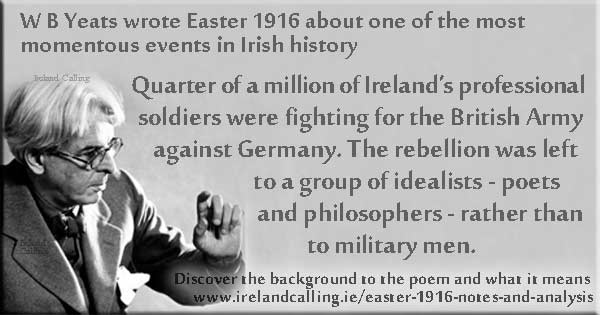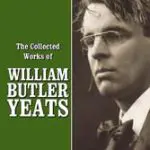Easter, 1916 by W B Yeats is set in the aftermath of the Easter Rising of 1916, when a small group of Irish nationalists led a rebellion to overthrow British rule and establish an independent Ireland.
It was a strange kind of rebellion. Ireland’s professional soldiers – a quarter of a million of them – were fighting for the British Army against Germany. The rebellion was therefore left to a group of idealists. – poets and philosophers – rather than to military men.
It was quickly put down and looked to be a complete failure – a “casual comedy” as Yeats put it. Yet, in spite of this, it went on to become a turning point in Irish history.
Irish public opinion was largely hostile to the rebellion at first, but that changed when the leaders were executed. The executions were seen as a brutal overreaction and turned Irish opinion against Britain and in favour of the Nationalists. In this way, as Yeats puts it, a “terrible beauty is born”.
Easter, 1916 gives Yeats’ view of the rebels from the days before the Rising and relates how those views changed afterwards.
First stanza – a terrible beauty is born
The structure of Easter, 1916 spells out the date the rebellion began, April 24, 1916. There are 16 lines in the first and third stanzas, and there are 24 lines in the second and fourth stanzas. There are also four stanzas representing April, the fourth month of the year.
Most of the leaders were prominent in Irish Nationalist circles. In the opening, Yeats tells of how he would sometimes chance to meet them on the street as they came out of work. They had “vivid” faces, perhaps hinting at the energy and idealism to come.
Yeats would have known most of them personally having dabbled in Nationalist politics himself as a young man. He would therefore stop and exchange pleasantries or “polite meaningless words” but he did not take them seriously.
Indeed, he would be just as likely to mock them and tell amusing stories about them when he met his friends later in his club.
He thought that he and the rebels only lived where “motley” is worn, that is a reference to clothes of any colour without any particular significance or belief. This contrasts with the idealism summed in the phrase “wherever green is worn” at the end of the poem.

Easter, 1916
I have met them at close of day
Coming with vivid faces
From counter or desk among grey
Eighteenth-century houses.
I have passed with a nod of the head
Or polite meaningless words,
Or have lingered awhile and said
Polite meaningless words,
And thought before I had done
Of a mocking tale or a gibe
To please a companion
Around the fire at the club,
Being certain that they and I
But lived where motley is worn:
All changed, changed utterly:
A terrible beauty is born.
That woman’s days were spent
In ignorant good-will,
Her nights in argument
Until her voice grew shrill.
What voice more sweet than hers
When, young and beautiful,
She rode to harriers?
This man had kept a school
And rode our wingèd horse;
This other his helper and friend
Was coming into his force;
He might have won fame in the end,
So sensitive his nature seemed,
So daring and sweet his thought.
This other man I had dreamed
A drunken, vainglorious lout.
He had done most bitter wrong
To some who are near my heart,
Yet I number him in the song;
He, too, has resigned his part
In the casual comedy;
He, too, has been changed in his turn,
Transformed utterly:
A terrible beauty is born.
Hearts with one purpose alone
Through summer and winter seem
Enchanted to a stone
To trouble the living stream.
The horse that comes from the road,
The rider, the birds that range
From cloud to tumbling cloud,
Minute by minute they change;
A shadow of cloud on the stream
Changes minute by minute;
A horse-hoof slides on the brim,
And a horse plashes within it;
The long-legged moor-hens dive,
And hens to moor-cocks call;
Minute by minute they live:
The stone’s in the midst of all.
Too long a sacrifice
Can make a stone of the heart.
O when may it suffice?
That is Heaven’s part, our part
To murmur name upon name,
As a mother names her child
When sleep at last has come
On limbs that had run wild.
What is it but nightfall?
No, no, not night but death;
Was it needless death after all?
For England may keep faith
For all that is done and said.
We know their dream; enough
To know they dreamed and are dead;
And what if excess of love
Bewildered them till they died?
I write it out in a verse—
MacDonagh and MacBride
And Connolly and Pearse
Now and in time to be,
Wherever green is worn,
Are changed, changed utterly:
A terrible beauty is born.

Easter, 1916 – Main characters

